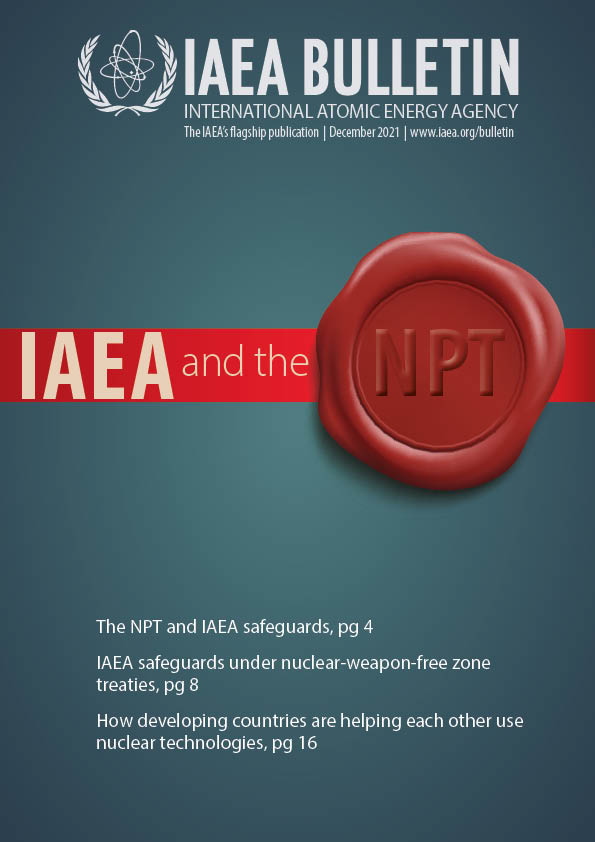Across the globe, peaceful nuclear applications — such as nuclear power and medicine — and the benefits they bring are in increasing demand. However, nuclear material and technology can also be used to produce nuclear weapons. To help ensure that nuclear material and technology remain in peaceful use, the IAEA conducts verification activities under a system known as nuclear safeguards. The IAEA also assists States in strengthening the implementation of safeguards through workshops, training courses, a traineeship programme, peer review missions and other forms of assistance.
The Treaty on the Non-Proliferation of Nuclear Weapons (NPT) requires non-nuclear-weapon States party to the Treaty to enter into a legally binding agreement with the IAEA, known as a comprehensive safeguards agreement (CSA) (see article.) Among the 178 NPT States with a CSA in force, 132 also have an additional protocol (AP) in force. An AP provides the IAEA with greater access to information and locations, and provides the IAEA with further insight into a State’s nuclear programme and plans, as well as its nuclear-related trade.
When countries bring a CSA into force, they take on obligations to host safeguards inspections of their nuclear facilities and other related locations, and to provide relevant information to the IAEA. These obligations increase under an AP. Tajikistan brought both a CSA and an AP into force in 2004. Under a CSA, each State is required to establish and maintain a State system of accounting for and control of nuclear material (SSAC). Based on this requirement, the State undertakes to maintain records and reports of all quantities of nuclear material within the State, including material received, produced and shipped by the State.
In order to support the country in meeting these obligations, the Government of Tajikistan requested the IAEA’s help in the form of an IAEA State System of Accounting for and Control of Nuclear Material Advisory Service (ISSAS) mission.
Available to all States with a CSA in force, an ISSAS mission reviews and evaluates the performance of a State’s SSAC and identifies areas where further cooperation with the IAEA could increase the effectiveness and efficiency of safeguards for both sides.
The mission provides recommendations on how to address any areas identified for improvement, as well as good practices. Since 2004, 24 ISSAS missions have been performed in 23 countries.
“Tajikistan is, and has always been, strongly committed to fulfilling its safeguards obligations,” said Ilhom Mirsaidzoda, Director of Tajikistan’s Nuclear and Radiation Safety Agency. “The ISSAS mission helped us better understand the requirements for safeguards implementation, as well as how we can strengthen our cooperation with the IAEA to streamline the verification process both for us and for the IAEA.”
ISSAS missions consist of two parts: a preparatory visit and the evaluation itself. A mission typically includes a review of written material provided by the State, such as respective laws, regulations and procedures; interviews with officials; and the direct observation of the practices and systems in place at the organizations and locations identified. The ISSAS mission team then evaluates its findings and prepares a mission report, including an agreed action plan with the State.
Tajikistan has also tapped into other types of IAEA assistance in safeguards implementation, such as a national training course organized by the IAEA, which took place in Dushanbe in June 2018, and hands-on training in the use of IT software to submit safeguards-related information to the IAEA. Tajikistan’s experience is testament to the benefits of a State working together with the IAEA to meet its international non-proliferation obligations, said Takehito Watanabe, nuclear safeguards inspector and safeguards country officer for Tajikistan at the IAEA.
Tajikistan now uses its experience to hold training courses and share its knowledge with its regional partners. “By bringing together our counterparts from across the region to share our knowledge in applying our comprehensive safeguards agreement and our additional protocol, as well as by sharing our experience from hosting an ISSAS mission, we hope that other countries may also benefit from the lessons learned. We would also recommend other countries to take advantage of an ISSAS mission,” said Mirsaidzoda.

